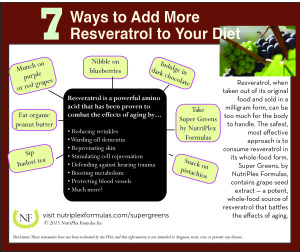Nowadays, it seems like every supplement, drug, and cosmetic company has “the secret” to staying and feeling young. They price their products as high as they can get away with charging. Oftentimes, though, not only do these substances fail to work as promised, but people end up plagued with a host of side effects.
The key to combatting the effects of aging is to use products that are natural and do not cause side effects. Over the past few years, resveratrol has become increasingly popular on the anti-aging market. But what does the science say?
on the anti-aging market. But what does the science say?
Resveratrol is an antioxidant found in various food sources, such as chocolate and the skins of certain nuts, berries and fruits. It has been the subject of intensive study. Keep in mind, though, that it’s best to consume resveratrol by eating the whole food, such as grape skins and grape seeds, instead of popping resveratrol pills.
Take a look at the following 7 ways resveratrol has been found to combat aging and its effects:
- Supports Cell Replication: Resveratrol has been found to stimulate sirtuins, cellular proteins that have the ability to prolong cell life in the body. When sirtuins are excited, they increase in mitochondria activity. This produces energy within cells and potentially extends their lives. And, of course, longer cell life simply translates to longer human life.
- Keeps Your Heart Alive and Well: Of the conditions common to aging, heart problems are at the top of the chart. As part of its long list of benefits, resveratrol works to protect blood vessels from damage, reduce low-density lipoprotein cholesterol, and reduce the risk of inflammation and blood clotting.
- Weight Control: One of the most dreaded facts about getting older is the body’s resistance to weight loss. Luckily for us, resveratrol has undergone numerous studies proving its benefits on weight control. In a Dutch study, obese men who took 150mg of resveratrol daily experienced lower (healthier) blood sugar levels, decreased liver fat, and lower blood pressure after about a month. Then, in a French study, it was found that the antioxidant boosted the metabolism in primates, regulating their body temperatures and resting metabolic rates.
- Fights Hearing Loss: It’s been found that resveratrol also works to prevent damage caused by ischemic- (oxygen depletion), noise-, and age-related hearing loss. When two test groups were exposed to high-volume sound levels for various spans of time, the group that had been dosed with resveratrol every day, for weeks in advance, showed far less signs of hearing trauma than the control group.
- Fends off Dementia: In 2005, a study published in theJournal of Biological Chemistry stated that resveratrol was found to degrade amyloid beta proteins in a test tube. These proteins have the ability to cluster together and form the plaque that has been found in the brains of people with dementia. In 2009, more research was conducted, and it was discovered that older mice fed resveratrol for 45 days had a reduction in plaque formation. Additionally, it was discovered that individuals who drink red wine on a regular basis have an 80-percent lower risk of developing Alzheimer’s.
- Benefits Individuals with Type 2 Diabetes: A study published in the journal European Endocrinology touts the benefits of resveratrol for patients with, and patients at risk for, diabetes. It was found that when hypertensive patients with type 2 diabetes supplemented long-term with grape extract containing a small amount of resveratrol, the resveratrol had a beneficial immunomodulatory (immune system supporting) effect, lowered blood glucose, reduced glycated hemoglobin, brought down insulin levels, decreased insulin resistance, and improved HDL levels and fasting blood glucose.
- Protects Against Skin Aging: As we age, our skin cells typically turn over at increasingly slower rates, leading to more wrinkles, discoloration, and dull complexions. To counteract this process, resveratrol works to regulate the turnover of our skin cells, keeping the skin’s appearance healthy, firm, and elastic. Resveratrol has a medley of other skin benefits, too, such as protection from free radicals and skin cancer.
Unfortunately, what most companies end up missing when they create a product with resveratrol, is that the antioxidant needs all the constituents that come along with it in the food from which it’s extracted. Otherwise, resveratrol won’t live up to its potential, and/or it’ll cause side effects. A good source of resveratrol in whole-food, nutritional supplement form, though, is offered by NutriPlex Formulas, in their Super Greens and VasCor supplements.
http://www.ncbi.nlm.nih.gov/pubmed/21261640
http://www.ncbi.nlm.nih.gov/pubmed/14595267/
http://www.m.webmd.com/healthy-beauty/features/drinking-wine-antiaging
http://www.forbes.com/sites/melaniehaiken/2013/06/22/3-new-fat-busting-supplements-for-speedy-weight-loss/
http://www.touchendocrinology.com/articles/resveratrol-management-diabetes-and-its-downstream-pathologies/page/1/0
http://www.dementiaresearchfoundation.org.au/tags/resveratrol
http://www.huffingtonpost.com/2013/07/02/anti-aging-is-resveratrol-the-magic-bullet_n_3534925.html
[getsocial app=”sharing_bar”]
